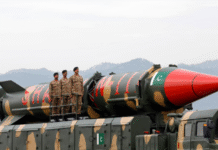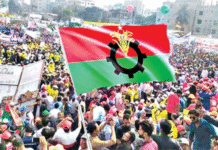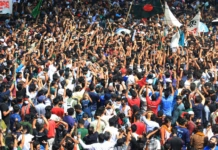
BANGKOK — After spending more than a decade and nearly $300 million, the United Nations-backed tribunal prosecuting the crimes of the Khmer Rouge has convicted just three men.
It appears now that they could be the only people to answer in court for the deaths of at least 1.7 million Cambodians from 1975 to 1979 in one of the worst episodes of mass killing in the last century.
Three more potential defendants have been investigated by the tribunal, an ungainly mix of Cambodian and international prosecutors and judges. But because of resistance on the Cambodian side, there are serious doubts that their indictments will proceed.
“From the start, the Cambodian government had a very different idea about how many people would be tried, and their view appears to be prevailing,” said Alexander Hinton, an anthropology professor at Rutgers University-Newark. “The court’s legacy will be tainted and greatly diminished if it fails to try further cases.”
The trial’s slow pace and its susceptibility to political interference are in part a result of an awkward compromise reached by Cambodia and the United Nations when they agreed to set up a combined international court, which formally began in 2006.
Questions about the tribunal’s effectiveness and independence have been raised from the start.
“From the perspective of truth and justice, a de facto show trial of a few senior political figures would almost be a worst-case scenario,” Stephen Heder, an expert on Cambodia at the School of Oriental and African Studies in London, said in 2003 as plans for the tribunal were being put in place.
Of the three people convicted, two were members of the highest circle of the radical Communist regime: Nuon Chea, 90, who was No. 2 in the hierarchy, and Khieu Samphan, 85, the chief of state. They were sentenced to life in prison for crimes against humanity and are undergoing a separate trial for genocide and other crimes.

The third convict, Kaing Guek Eav, known as Duch, who commanded a notorious Khmer Rouge prison, was also sentenced to life in prison for crimes against humanity.
Prime Minister Hun Sen has opposed further indictments, suggesting that an expanded trial would lead to civil war. Hor Namhong, the former foreign minister, said when he held the post that further indictments “will not be allowed.”
The government includes several former members of the Khmer Rouge, including Mr. Hun Sen himself, and it has been careful to protect its own. In addition to trying to limit the number of defendants, it has denied access to potential witnesses who now hold influential government positions.
The limited number of convictions is partly the result of the quarter-century of civil war and political turmoil that elapsed between the fall of the Khmer Rouge and the start of the trials.
Many potential defendants are no longer alive, including Pol Pot, the movement’s chief, who died in 1998. Two of the original five defendants died before their trials were completed.
The small number of defendants also reflects the court’s narrow brief to try only “senior leaders” and those who were “most responsible” for the crimes. That second category is open to interpretation and has so far been applied to only one person, Duch, the prison superintendent.
In February, the court ruled that another Khmer Rouge official, Im Chaem, 74, did not fit in the “most responsible” category, although she was accused of overseeing the deaths of tens of thousands of people in a labor camp. Charges against her were dropped, leaving her to tend her garden and enjoy living among her children and grandchildren.

The tribunal’s awkward hybrid of Cambodian and international legal systems pairs Cambodian and foreign judges, who must reach at least a limited agreement on decisions.
That formula preserved the Cambodian sense of sovereignty while attempting to hold the court to legal standards advocated by the United Nations. Over the years, it has led to clashes between the international and Cambodian staff members over the scope of the trial.
Some disputes became bitter. In 2012, a Swiss jurist, Laurent Kasper-Ansermet, resigned as a reserve co-investigating judge and issued a statement denouncing what he said were “egregious dysfunctions” within the tribunal and government interference in his investigations of additional defendants.
In a report last year, the Open Society Justice Initiative criticized “the apparent ongoing government interference” into the progress of further cases, as well as “delayed and tepid responses from the U.N. and the international officials of the court.” It said this dynamic “generates cynicism and basic distrust of the institution.”
Heather Ryan, an expert on the trials with the Justice Initiative, added that the slow pace of the trial fed on itself, creating a kind of complacency, “a sense that the money will go on forever and people’s patience will go on forever.”
But for all its flaws, the tribunal plays an important role in Cambodia’s recovery from the Khmer Rouge years, said Mr. Hinton, author of a new book on the Duch trial, “Man or Monster?”
“Amidst all of the political storms, it’s remarkable that the court has been able to deliver two final judgments that are viewed as relatively fair and legally sound,” he said, referring to the separate trials of Duch and of the two senior leaders. “It has delivered a degree of justice, both for the victims and the spirits of the dead.”

He added: “Bottom line, would you rather have the justice that was rendered here — this court, with all its problems — or have nothing at all?” Given the political realities, he said, this was the only court on offer.
Without a tribunal to examine and adjudicate its traumatic past, Cambodia would in large part have been left in the dark, and the worst perpetrators would have been left to live out their days in quiet retirement.
In addition to the convictions it has reached, the tribunal has brought the crimes of the Khmer Rouge into the open in a society where survivors often prefer to forget and where the younger generation is often mistrustful and disbelieving.
“They have established a culture of debate in this broken society, and any talk about the tribunal is extremely important for Cambodia,” said Youk Chhang, director of the Documentation Center of Cambodia, the country’s main repository for records of the Khmer Rouge years. The court proceedings now define the Khmer Rouge era for the public, he said.
In 2009 as the trials progressed, a short history of the Khmer Rouge period was for the first time included in high school curriculums, after 30 years of silence.
But there is fundamental disagreement among scholars in assessing the tribunal’s value beyond the three convictions.

Peter Maguire, who has taught law and theory of war at Columbia University and other institutions, derided as “therapeutic legalism” the notion that war crimes trials can offer such benefits as healing, national reconciliation and closure for the victims.
“Trials, at best, convict the guilty and exonerate the innocent,” he said. “To freight a court with a nonjudicial, slightly New Age, therapeutic agenda and predict positive outcomes is an act of intellectual dishonesty.”
The opposite view was voiced by Philippe Sands, a professor of law and director of the Center on International Courts and Tribunals at University College London.
“I don’t think it’s a fair sign of success or failure just to look at dollar signs and convictions,” he said. “The bigger question is, To what extent has this tribunal contributed to beginning the process of embedding the idea of justice, the absence of impunity, into public consciousness, to help Cambodia transition to a better place?”
Among the ranks of war crimes tribunals, the Cambodian court will count as the most vulnerable to political pressure and the least able to counter it, said Thierry Cruvellier, a journalist who has covered most of them.
Taking a decade to convict three men “is clearly not a great achievement,” he said, though the time and expense are modest by tribunal standards.
The war crimes trial for the Rwandan genocide lasted 20 years, produced 61 sentences and 14 acquittals, and cost between $1 billion and $2 billion. The tribunal for the former Yugoslavia is drawing to an end after 23 years, with a record of 83 convictions and 19 acquittals and a price tag estimated at more than $2 billion.
The Cambodian tribunal has had one inarguable success, Mr. Cruvellier said: Three of the perpetrators lived long enough to answer for their crimes.
“In that sense the court got a bit lucky,” he said, “because eventually they had the time to convict them, even though they took way too much time.”
Source: NY Times









